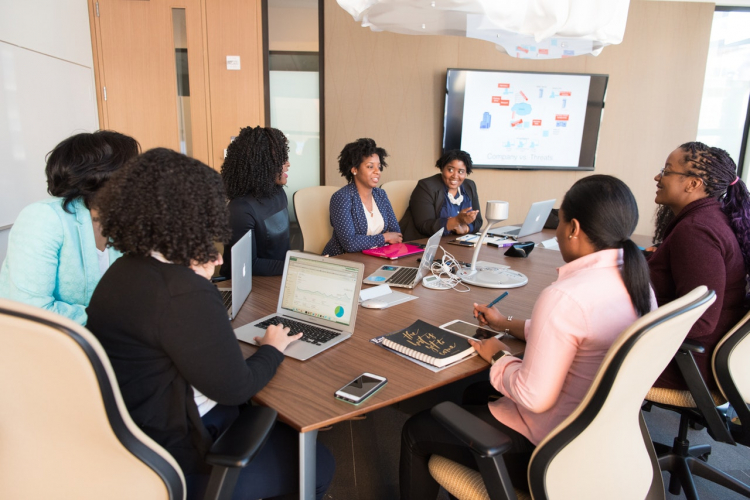Sports & Journalism: A Woman's World

Take your toxic masculinity and shove it, American culture; women in sports and journalism can do bad all by themselves. Their increasing presence in sports and journalism is no fluke, and they don’t need a male savior to swoop down and tell them that everything’s going to be okay.
Stop what you’re doing right now; I’d like to tell you something you might not know about me.
My name is Ricky J. Marc. I’m a Master’s student in Diplomacy and International Law. I’m a cisgender (defined by Merriam-Webster as meaning my gender identity corresponds with the sex I was identified with at birth), heterosexual male, and I’m a feminist. I’ve been a feminist for a couple of years now.
I have my own male privilege to blame as well. For some time, I felt a sense of latent hostility to the term because of negative stereotypes. I didn’t even realize toxic masculinity, as explained by Pop Culture Detective's Jonathan McIntosh, was at fault within my heart.
It wasn’t until I had some thoughtful conversations with brilliant women that I realized the differences between social egalitarianism and feminism as a specific term. Here’s what I understand now: Women deserve much more praise, credit, and respect—not so much as entertainment, per se, but as equals, both online and off.
Feminism, as defined by Eastern Kentucky's Lisa Day, is an interdisciplinary approach to issues of equality and equity based on gender, gender expression, gender identity, sex, and sexuality as understood through social theories and political activism. There are many myths about feminism as it is known in today’s world—myths that were addressed in an AJ+ piece featuring Franchesca Fiorentini.
Many women still fear for their lives just walking down the street. This is due to a combination of misogyny and an antiquated understanding of consent. This is dangerous. Women all around the world still face the specter of catcalling and offensive remarks in public, as demonstrated by Daily Mail Online. If you’re reading this and you identify as a man, you have a responsibility to rebuke, shun, and discourage this behavior. We all have a role to play.
It’s time to embrace the intersectionality of differing versions of feminism among society’s different groups—such as feminism among different races, religions, sexual preferences, classes, and even social groups. Men must listen to the words that women are trying to share, and we must use our male privilege to uplift them to an equal footing in society.
Sports and journalism are no different. I am both inspired and heartened by the increasing presence of women in prominent sports and journalism. There was once a time when playing like a girl was just a sexist insult; today, it’s something to be proud of.
I follow some of the sports industry’s most talented women because they are good at what they do. They are witty, talented, smart, and often funny. Just as I am more than the beautiful melanin in my skin, these women are more than their physical features. A Huffington Post article identifies that female objectification has spiked in the internet age, and anonymity further bolsters this problem. It encourages male cowardice in the face of patriarchal insecurity, and ESPN’s Sarah Spain is no stranger to that.
A particularly frustrating example of this objectification is made evident through the eyes of a very talented Palestinian-American journalist, on-air presenter, and producer. Her name is Dena Takruri, and she works for AJ+, Al Jazeera’s digital media network. She’s easily one of my favorites in the industry, bar none.
In a remarkably candid interview with Nieman Storyboard’s Julissa Treviño, Dena explains:
"Regardless of how serious the reporting is, and how good the journalism is, I will always be seen as a woman. That means I’m subject to a lot of objectification and sexualization, and it’s very dehumanizing. One of my colleagues who does audience development and manages the YouTube channel has to constantly ban users because they’re commenting on the shape of my body and my appearance. Talking about a news video as if it was porn. It’s to the point where I’ve told my cameraman to only shoot me from the waist up. That’s really upsetting because you want to be judged by the quality of your work, not by your appearance. That’s something I’m constantly struggling to address. It really is a problem."
Shameful. Women deserve an army of community support that recognizes and respects their ability to do just as good (if not better) a job as the established men in this industry. It’s on us to rebuke idiots. We can’t continue to tolerate the way they’re treated online and in the media. It’s time to be much more welcoming and respectful.
So what can any of us do? What can men do to help move society forward? Men and women, together, need to start having conversations about how women are treated in society. Male oppression of women may begin in the heart and mind, but it festers when we’re with one another.
We all have a significant role to play in the way women are perceived and treated in media and society. It’s on us to curb catcalling. It’s on us to stand up for women all around the world, not just in our neighborhoods. We lose nothing by fighting for their equality. We’re all better when we’re all better.
Canadian Prime Minister Justin Trudeau is right: It’s time for us men to become feminists too, and we shouldn’t be afraid of that.








